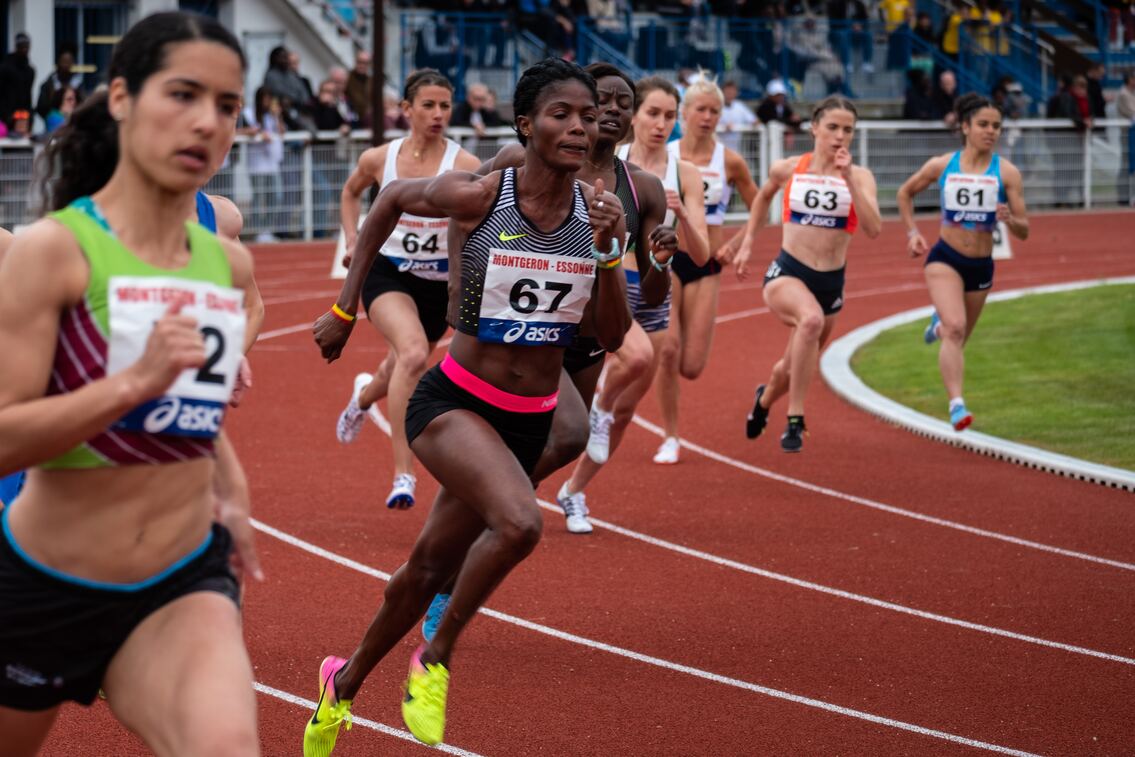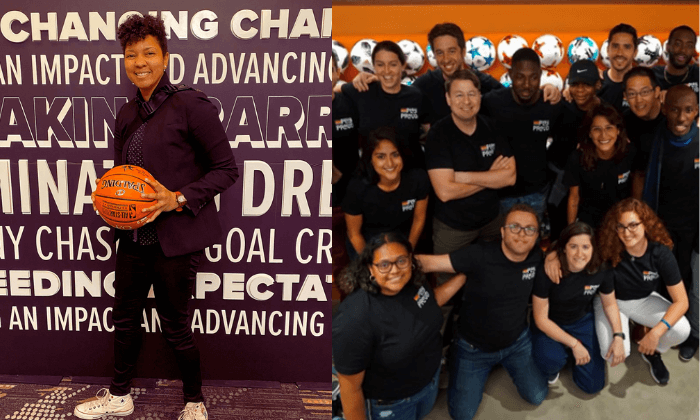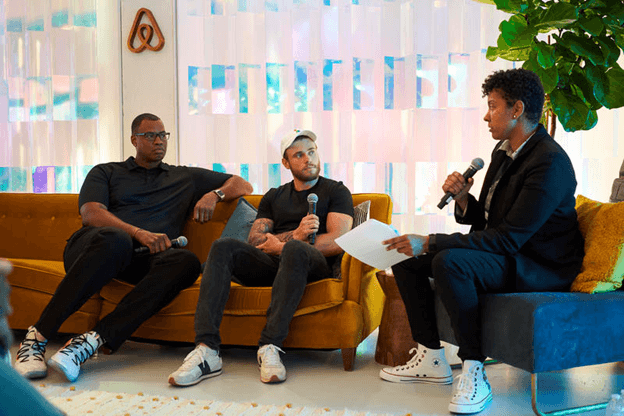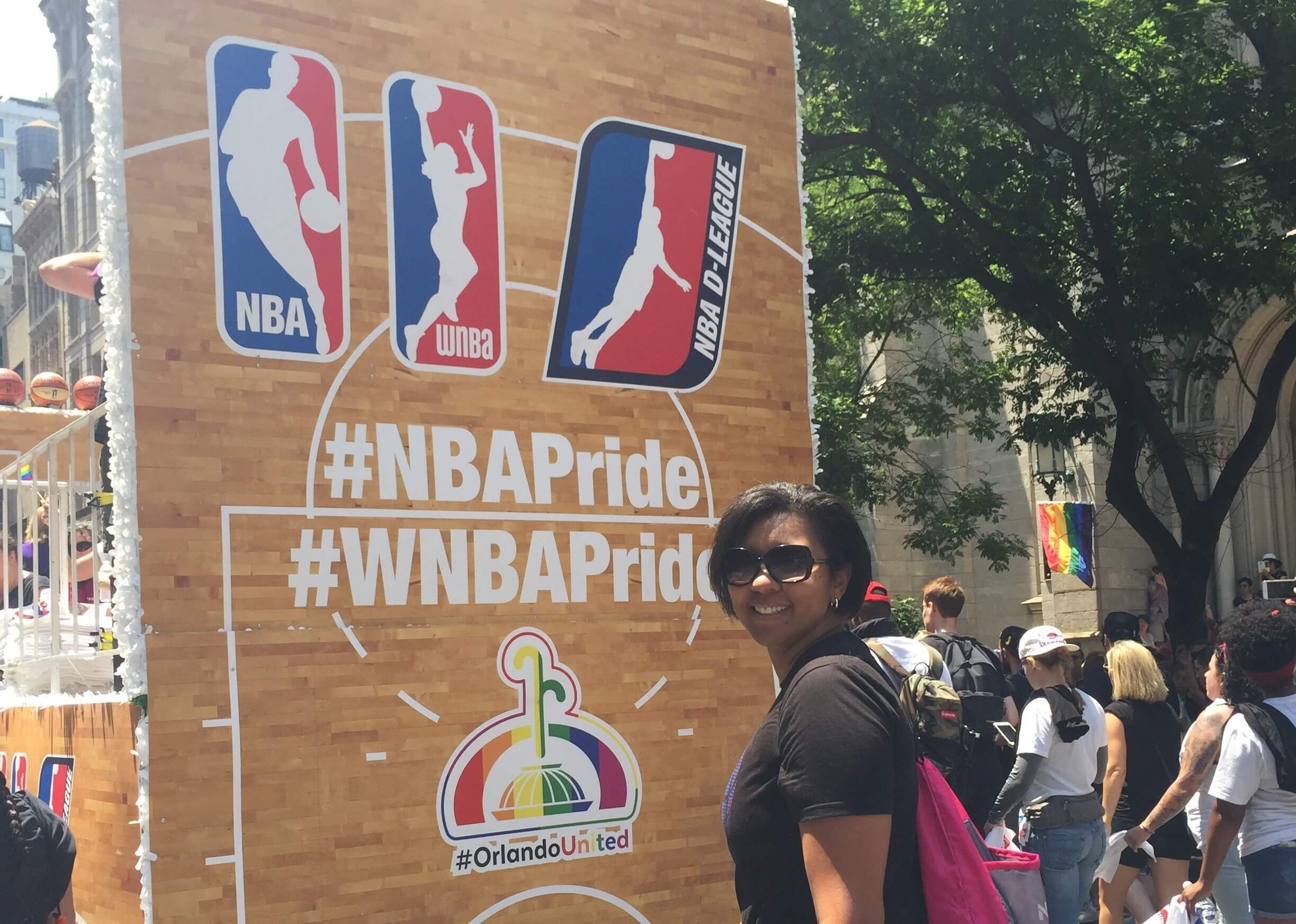
Pride Month in Focus: The Inclusion Playbook
Making Sports More Equitable and Inclusive
June 2, 2023
This month, many countries around the world are celebrating Pride Month. In recognition, we’re highlighting members of our network who are supporting the LGBTQ+ community through sport. Read our interview with Ashland Johnson, Esq. (she/her), President & Founder of The Inclusion Playbook. Working with teams, leagues, governing bodies, schools, athletes, coaches and social justice advocates across the United States - and at times internationally - the non-profit “envisions a world where sports empower and strengthen all of our communities.”
Ashland, a former collegiate Division I athlete, created the Inclusion Playbook in 2019 to advance diversity, equity, inclusion and social responsibility in sports, knowing firsthand the value of creating inclusive, accessible and equitable sports spaces. The organization is made up of a collective of former athletes and sports professionals who are uniting policy and social justice to drive change within athletic organizations and society at large. The non-profit's services emphasize three core focus areas: racial justice, gender equity and LGBTQ+ inclusion.
Ashland spoke to us about sports and social justice, the impact of trans athlete bans on youth mental health, ways the sports community can support inclusion and more:

Why is it important for sport organizations to take a social justice approach to all aspects of their work and across all levels of their organizations?
One of the really interesting things about sports is that they reflect what’s happening in all of our communities. For instance, racial stereotyping and gender discrimination that occurs at a societal level shows up in sports spaces. Look at what’s happening to Vinícius Júnior in Spain, or here with AAPI (Asian American Pacific Islander) folks who compete while contending with harmful myths and stereotypes about their athletic abilities. Women don’t have the same number of professional opportunities and don’t get the same level of investment as men do in most settings. In sports, women have far fewer resources and opportunities to participate from elementary school onward.
All this to say that sports are not removed from what’s going on in our communities every day. But what’s really powerful about them is that they provide a huge platform and the opportunity to confront these systemic issues. The values inherent in sports are so compatible with addressing inequality - bringing people together across cultures, leveling the playing field, supporting our teammates, celebrating our differences and more. We can use the sports space to create a more inclusive environment that transforms the experience of athletes, but also creates a better world outside of sports too.
Anti-LGBTQ+ bills, particularly targeting trans athletes, have reached record levels in the US. What do you think has prompted the rise of transgender athlete bans?
Going back to the idea that sports reflect what’s happening in the world around us, sports are often looped into the so-called “culture wars.” In other words, they’ve been increasingly politicized and wielded for social and cultural influence. Transgender people have become a political target in society at large and now are being targeted with these bans under the guise of “protecting women’s sports.” In reality, many women athletes express frustration given the many real issues facing women’s sports - such as equal pay, addressing sexual harassment, ensuring equal facilities – yet the exclusion of transgender women is getting widespread attention and creating a problem that does not exist.
Not only are transgender women drastically underrepresented in sports spaces, but research shows that their participation doesn’t hurt the performance or participation of cisgender women in sport. These bans are not really about trans women or trans youth being a threat to women’s sports. It’s just easy for people in power to target vulnerable communities for their benefit, and this is another avenue to target transgender people at large.

What do you feel is the impact of this rising adversity on the overall sport landscape and specifically on the mental health of LGBTQ+ youth?
Access to sports and movement has a myriad of benefits in the realm of social, physical, mental and emotional health. Rhetoric and policy that seek to prevent LGBTQ+ youth from accessing these spaces directly attacks their wellbeing; it both communicates that they are not welcome in sporting spaces and prevents them from accessing the benefits that sports provide. Even when anti-LGBTQ+ policies are not ultimately passed, research shows that the discussion itself has marked negative impacts on their mental health. The misinformation, myths and stereotypes about transgender athletes are incredibly dangerous and will have lasting impacts on the mental health of transgender people - and specifically transgender youth.
Research suggests that LGBTQ+ youth and adults are less active and more likely to drop out of sports because of social exclusion and feeling unsafe. How can the sports community support their inclusion and safety?
LGBTQ+ people face a lot of discrimination in sports spaces - so creating inclusive environments is paramount to ensuring that they can access sports just like any other participant. There are so many levers to pull to do this work - from updating your organization’s policies to more inclusive best practices, to training your staff/coaches on LGBTQ+ inclusion, to partnering with local organizations to get better connected to local LGBTQ+ equity spaces, to creating LGBTQ+ inclusive fan/team codes-of-conduct and more.
Just like anything in sports, you need to practice these skills to get better. There is no single path or journey, but rather an act of consistently being intentional about LGBTQ+ inclusion and getting the reps in.
How does the Inclusion Playbook work to create a more equitable and inclusive space for all in sport?
We aim to do this on multiple fronts. There’s an educational component to this work that involves training, conversation and practice. We want to help people understand what racial justice, equity and inclusion mean and how these concepts can be a lens to improve the experience within their sports organizations and communities. Another major component of this work relates to policy change - making sure that an organization’s policies, practices and procedures reflect a commitment to equity. We work to bring key players and affected communities into this process to design sports spaces that support and affirm everyone. Finally, we do a fair bit of research and resource creation to equip people on the ground with the resources they need to address challenges in front of them and advocate for more inclusive sports spaces.
Speaking about policies and legislation, in April the Department of Education proposed a rule affirming that Title IX secures the right of transgender, non-binary and intersex students in sports. How can we hold schools and local communities to account in adhering to rules such as this and why is it so important for legislation like Title IX affirm and clarify proposals that affect LGBTQ+ athletes?
Policies set the foundation that inclusive practices are built on. It’s so important to have policies clarify and cement the protection of LGBTQ+ people. This Title IX rule sets a precedent based on evidence, not misinformation and stereotypes, which will have ripple effects in local policies across the country. Public education efforts are huge here – we have to make sure schools and local communities understand this ruling, the facts behind it and how to ensure their communities are best supporting transgender, non-binary and intersex students interested in athletics.

In recognition of Pride Month, what is the most important thing you’d like for the public and those in leadership positions to understand about what the situation is like for LGBTQ+ athletes currently? What can everyone do to help?
LGBTQ+ athletes just want to participate and play the sport that they love, just like everyone else. There are many ways for allies to show up, from publicly denouncing anti-LGBTQ+ rhetoric and discrimination to normalizing gender diversity. Protest anti-trans bills, sign petitions, change your organization’s policies, run a fundraiser, put support into action.
Sports leadership should stay up to date on what science really says about trans women’s performance in sports - that we should be inclusive of transgender women - and develop policies that align with that science. Everyone - fans, teammates, coaches, executives - has a role to play in making our environments more LGBTQ+ inclusive.
The Inclusion Playbook is a program partner on the Rexona (also known as Sure, Degree or Shield) Breaking Limits Program run in partnership with Beyond Sport. As part of the Program’s digital training series, designed to support coaches and young leaders, the Inclusion Playbook created a Training Module focused on LGBTQ+ inclusion. Click here to sign up to access the training series (available in English, Spanish and Portuguese).